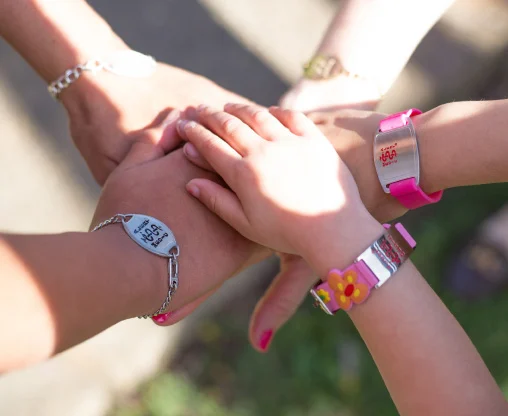More than 32 million people in the United States have food allergies. About 5.6 million are children. And children with food allergies are two to four times more likely to have asthma or other allergic diseases. COVID-19 (the new coronavirus) has impacted our food supply, making it harder for people with food allergies to buy safe food.
To kick off National Asthma and Allergy Awareness Month, the Asthma and Allergy Foundation of America (AAFA) and the MedicAlert Foundation have partnered to raise awareness and provide resources for people who live with allergies and anaphylaxis. (Kids With Food Allergies is a division of AAFA).
“Despite advancements in research, medicine and public policy, these chronic conditions are still some of the most costly for individuals and society,” said Kenneth Mendez, AAFA’s CEO and president. “There’s no cure for asthma or allergies. But they can be managed in ways that help avoid the worst outcomes.”
Impacts of COVID-19 on People With Food Allergies
Food supplies have been affected by COVID-19 in many ways. People have stocked up to prepare for stay-at-home orders, emptying the grocery shelves. Some allergy-friendly food companies have had to reduce staff, close or keep up with a high demand for online orders.
The nation's health care system is also under a lot of stress right now. Families managing food allergies want to prevent anaphylaxis to avoid trips to the emergency department during the COVID-19 pandemic.
During National Asthma and Allergy Awareness Month and throughout 2020, we will work as a team to reduce serious allergic reactions (anaphylaxis). MedicAlert and AAFA will also work together on COVID-19 resources to help families managing food allergies.
ACT for Allergy
You can join our efforts by making a pact to ACT for allergy.
- “A” means your child should have an action plan for anaphylaxis.
- “C” reminds you to carry your child's emergency medicines and have your child wear a medical ID to alert others of their condition.
- “T” calls for treatment plans, both for ongoing therapies and emergencies.
We are working together to create an online anaphylaxis action plan. This plan will be part of the MedicAlert member health profile. It will work like a written action plan, with specific actions to take based on your child's symptoms. The online action plan will make it easier fo you to access your child's vital information in an emergency.
“MedicAlert was founded in 1956 because of a near-fatal allergic reaction – so this is in our DNA,” said Josefina Jervis, COO and president of the MedicAlert Foundation. “Having a personalized action plan that can be stored and accessed online is an important safety measure for people with asthma and allergies. In an emergency, MedicAlert will relay the action plan and other critical medical information to first responders to ensure fast and accurate treatment. Someone having an asthma attack or anaphylactic reaction may not be able to talk. MedicAlert can be their voice.”
Planning and preparation are key to helping your child avoid allergic reactions.
A MedicAlert ID and membership can help protect those with allergies and asthma in the event of an emergency. If you can’t speak for yourself, MedicAlert can be be your voice.
When you enroll in a new MedicAlert membership through this special link or via phone [1.800.432.5378], use the code AAFA and MedicAlert will donate 20% of your membership fees to support the mission of the Asthma and Allergy Foundation of America to save lives and reduce the burden of disease for people with asthma and allergies through support, advocacy, education and research.
“One of the best things a person with asthma or allergies can do is to be prepared,” said Mendez. “That’s why the ACT protocol is so important. Having a plan and proactively avoiding triggers will help reduce the number of serious reactions. But still, life-threatening events will happen. In that case, having a MedicAlert ID could be the difference between life and death.”
Better Emergency Response
AAFA and MedicAlert will also create training for first responders and medical personnel. We will create the continuing education based on current medical guidelines for treating asthma attacks and severe allergic reactions.
“For over 60 years, MedicAlert has served the first responder community,” said Jervis. “The new partnership with AAFA aligns perfectly with our mission of saving and protecting lives by sharing vital information in emergencies. Together with AAFA we can improve outcomes for people with asthma attacks or anaphylactic reactions.”
How Can I Raise Awareness About Food Allergies?
Visit kidswithfoodallergies.org/act to make a pact to ACT for allergies along with AAFA and MedicAlert.Visit kidswithfoodallergies.org/awarenessmonth to share social media tools, learn about awareness events, support KFA through fundraising and more.
Join our online community where you can get talk to other parents managing food allergies and stay up to date on news and research.



Comments (0)